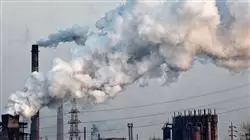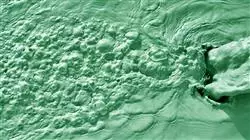University certificate
The world's largest faculty of engineering”
Introduction to the Program
Acquire the skills required to intervene professionally in the aspects derived from water cycles and wastewater treatment with this high-level Postgraduate certificate"

This course will address the regulatory framework of the water sector, establishing the regulatory hierarchy, the European Water Charter and the guidelines of a sanctioning dossier. As an example, the current Bylaw on Management and Efficient Use in the city of Madrid, an example of water regulation and control, will be analyzed.
The uses and demand of water, as well as the costs and energy derived from its integral cycle and its heating in DHW generation, will be accurately analyzed. Within the hydro-efficiency management, measures for water management and efficient water use will be analyzed and developed, including the various water efficiency techniques, from plumbing devices at terminal points of sanitary equipment to other techniques for rainwater harvesting.
Furthermore, the processes associated with waste management will be studied in depth, establishing the associated regulatory framework and management strategies. The main techniques for energy recovery and waste recovery will be analyzed.
The innovative ZERO-WASTE initiative will be discussed in detail, where under the objective of the circular economy model, waste management will be redesigned, enhancing waste prevention and valuation actions in order to reduce the raw materials extracted. During the module, the guidelines and actions that an organization can apply in terms of Zero Waste will be analyzed.
By completing and passing the evaluations of this program, the student will obtain a solid knowledge of the rules and regulations to be applied in relation to environmental and energy management in organizations. A complete, high-intensity program, which will allow incorporating into practice the most updated knowledge in this field of work. A highly interesting subject due to its current relevance and the mandatory integration of the standards that will be studied in the Postgraduate certificate.
With an approach focused on efficiency, this Postgraduate certificate has been created to allow students to optimize their efforts and achieve the best learning results in the shortest possible time. Additionally, as it is a 100% online program, the student is not constrained by fixed timetables or the need to move to another physical location, but can access the contents at any time of the day, balancing their professional or personal life with their academic life.
An intensive and highly effective Postgraduate certificate that will allow professionals to make a qualitative leap in their professional practice in the environmental and energy management sector"
This Postgraduate certificate in Pollution and Water and Waste Management in Organizations contains the most complete and up-to-date educational program on the market. The most important features of the specialization are:
- Practical case studies presented by experts
- The graphic, schematic, and practical contents with which they are created, provide scientific and practical information on the disciplines that are essential for professional practice.
- Practical exercises where the self-assessment process can be carried out to improve learning
- Its special emphasis on innovative methodologies
- Theoretical lessons, questions to the expert, debate forums on controversial topics, and individual reflection assignments
- Access to content from any fixed or portable device with an Internet connection.
With comprehensive and up-to-date teaching material and the best audiovisual systems on the educational market, to provide you with an immersive learning experience"
Supported by excellent multimedia content, developed with the latest educational technology, this Postgraduate certificate will provide the professional with situated and contextual learning, i.e., study in a simulated environment that will provide immersive learning programmed to train in real situations.
This program is designed around Problem Based Learning, whereby the professional must try to solve the different professional practice situations that arise during the academic year. For this purpose, the professional will be assisted by an innovative interactive video system created by renowned and experienced experts.
With a broad and innovative look at the way of working that the sector is implementing in recent times"

A 100% online Postgraduate certificate that will allow you to combine your studies with your professional work with maximum organizational flexibility"
Why study at TECH?
TECH is the world’s largest online university. With an impressive catalog of more than 14,000 university programs available in 11 languages, it is positioned as a leader in employability, with a 99% job placement rate. In addition, it relies on an enormous faculty of more than 6,000 professors of the highest international renown.

Study at the world's largest online university and guarantee your professional success. The future starts at TECH”
The world’s best online university according to FORBES
The prestigious Forbes magazine, specialized in business and finance, has highlighted TECH as “the world's best online university” This is what they have recently stated in an article in their digital edition in which they echo the success story of this institution, “thanks to the academic offer it provides, the selection of its teaching staff, and an innovative learning method aimed at educating the professionals of the future”
A revolutionary study method, a cutting-edge faculty and a practical focus: the key to TECH's success.
The most complete study plans on the university scene
TECH offers the most complete study plans on the university scene, with syllabuses that cover fundamental concepts and, at the same time, the main scientific advances in their specific scientific areas. In addition, these programs are continuously being updated to guarantee students the academic vanguard and the most in-demand professional skills. In this way, the university's qualifications provide its graduates with a significant advantage to propel their careers to success.
TECH offers the most comprehensive and intensive study plans on the current university scene.
A world-class teaching staff
TECH's teaching staff is made up of more than 6,000 professors with the highest international recognition. Professors, researchers and top executives of multinational companies, including Isaiah Covington, performance coach of the Boston Celtics; Magda Romanska, principal investigator at Harvard MetaLAB; Ignacio Wistumba, chairman of the department of translational molecular pathology at MD Anderson Cancer Center; and D.W. Pine, creative director of TIME magazine, among others.
Internationally renowned experts, specialized in different branches of Health, Technology, Communication and Business, form part of the TECH faculty.
A unique learning method
TECH is the first university to use Relearning in all its programs. It is the best online learning methodology, accredited with international teaching quality certifications, provided by prestigious educational agencies. In addition, this disruptive educational model is complemented with the “Case Method”, thereby setting up a unique online teaching strategy. Innovative teaching resources are also implemented, including detailed videos, infographics and interactive summaries.
TECH combines Relearning and the Case Method in all its university programs to guarantee excellent theoretical and practical learning, studying whenever and wherever you want.
The world's largest online university
TECH is the world’s largest online university. We are the largest educational institution, with the best and widest online educational catalog, one hundred percent online and covering the vast majority of areas of knowledge. We offer a large selection of our own degrees and accredited online undergraduate and postgraduate degrees. In total, more than 14,000 university degrees, in eleven different languages, make us the largest educational largest in the world.
TECH has the world's most extensive catalog of academic and official programs, available in more than 11 languages.
Google Premier Partner
The American technology giant has awarded TECH the Google Google Premier Partner badge. This award, which is only available to 3% of the world's companies, highlights the efficient, flexible and tailored experience that this university provides to students. The recognition as a Google Premier Partner not only accredits the maximum rigor, performance and investment in TECH's digital infrastructures, but also places this university as one of the world's leading technology companies.
Google has positioned TECH in the top 3% of the world's most important technology companies by awarding it its Google Premier Partner badge.
The official online university of the NBA
TECH is the official online university of the NBA. Thanks to our agreement with the biggest league in basketball, we offer our students exclusive university programs, as well as a wide variety of educational resources focused on the business of the league and other areas of the sports industry. Each program is made up of a uniquely designed syllabus and features exceptional guest hosts: professionals with a distinguished sports background who will offer their expertise on the most relevant topics.
TECH has been selected by the NBA, the world's top basketball league, as its official online university.
The top-rated university by its students
Students have positioned TECH as the world's top-rated university on the main review websites, with a highest rating of 4.9 out of 5, obtained from more than 1,000 reviews. These results consolidate TECH as the benchmark university institution at an international level, reflecting the excellence and positive impact of its educational model.” reflecting the excellence and positive impact of its educational model.”
TECH is the world’s top-rated university by its students.
Leaders in employability
TECH has managed to become the leading university in employability. 99% of its students obtain jobs in the academic field they have studied, within one year of completing any of the university's programs. A similar number achieve immediate career enhancement. All this thanks to a study methodology that bases its effectiveness on the acquisition of practical skills, which are absolutely necessary for professional development.
99% of TECH graduates find a job within a year of completing their studies.
Postgraduate Certificate in Water and Waste Pollution and Management in Organizations
This program includes a complete update, deepening and systematization of the most important aspects of water management and pollution. Developed by TECH Global University, this Postgraduate Certificate in Pollution and Management of Water and Waste in Organizations will allow you to specialize in the different moments and characteristics of the hydrological cycle and the integral water cycle, as well as in the classification of wastewater in order to perform successfully in this field of engineering.
Specialize in hydrological treatment and sustainability
The main objective of this program is to provide engineering professionals with the latest updated and systematized information on the planning and management of water and its treatment processes, in order to improve operations within the sector and contribute to environmental sustainability. The curriculum will allow you to delve into the characteristics and classification of wastewater by composition, identify and develop strategies for the processing of all types of waste or efficient use of water, know the applicable legislation and regulatory framework for each of the cases that you must assume in this field of work.
Certify in the largest Faculty of Engineering
At TECH Global University we not only offer the most updated academic content in the market, but also innovative methodologies for online education. With the support of experts in the area you will strengthen your skills and boost the growth of your career while studying completely remotely, managing the pace that best suits your needs. Studying with us can be the next step to advance your professional goals.







